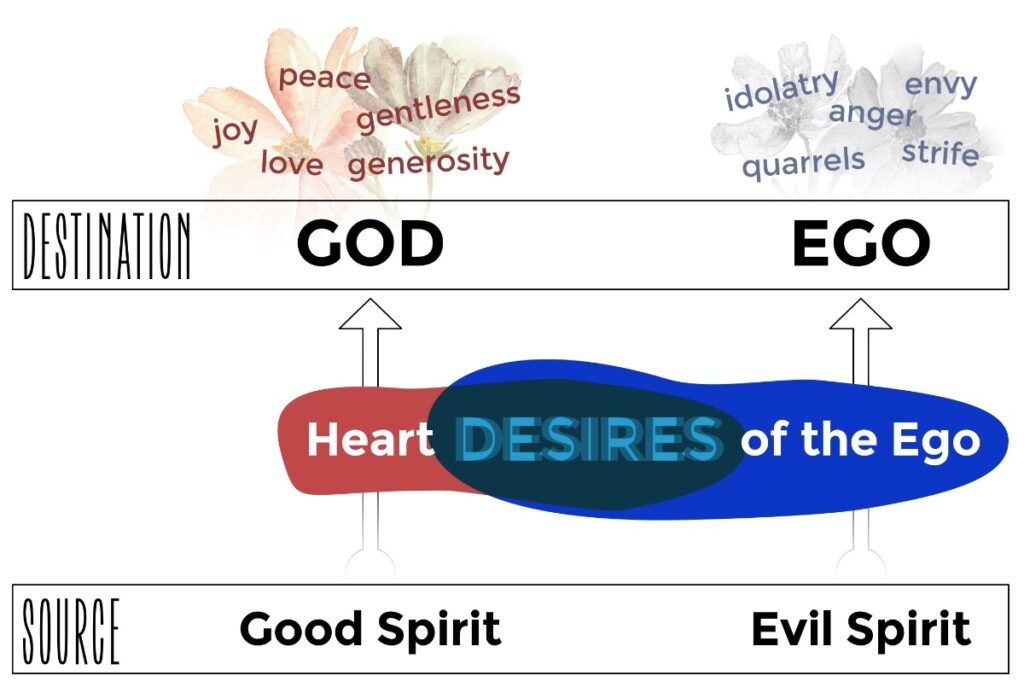Jesus said that we will know what is good by its fruit. In the spiritual life a fruit is what we see emerge as human beings respond to God in daily life. Fruits appear after we make choices, follow certain thought paths, and cultivate certain relationships. While desire may be the fuel that propels our lives forward from choice to choice, the fruit is the visible evidence of our trajectory. Have our desires and choices been keeping us in the flow that journeys toward God, or have they been coaxing us back toward our egos? Has the good spirit or the evil spirit been operative?
Movement Toward God
St. Paul wrote about the fruits of the Spirit in his letter to the Galatians. We tend to focus on his list of nine examples of fruits that come from God’s Spirit—things like love, joy, peace, and kindness, but he also names 15 fruits that can appear when we live “opposed to the Spirit”—things like anger, jealously, strife, and division. One list is a set of good fruits that come when the good spirit is operative in our lives, and the other is a list of bad fruits that show up when we’re giving into the evil spirit.

As we flow in one direction or the other, we’re either moving toward God or away from God, which Ignatius called consolation and desolation. In his Rules for the Discernment of Spirits, Ignatius said that one would experience the gentleness of the good spirit when they were maturing in their spiritual life. In other words, when you are in the flow of God’s Spirit and responding positively to the good and deep desires of your heart, you will notice the fruit of gentleness and peace emerge from within—fruits Paul names in Galatians. Ignatius describes the fruits of evil spirit more harshly, indicating an experience of disquiet, despair, and selfishness.
David Fleming, SJ paraphrases part of Ignatius’ Principle and Foundation this way: “All the things in this world are gifts of God, presented to us so that we can know God more easily and make a return of love more readily.” If we are responding sincerely and whole-heartedly to the gifts God gives us, we will see the fruits of the good spirit. When our responses are made more blindly and in service of the ego, we will see the fruits of the evil spirit. When that happens, Paul says, we will “not inherit the kingdom of God.” What is the kingdom of God? It is full, free, loving union with God. We experience that union when we are in consolation, in the flow toward God. When we experience desolation, unhealthy attachment, and unfreedom we lose a sense of that union.
 The Source and the Destination
The Source and the Destination
The Ignatian dichotomy of the good and evil spirit are what Paul names as Spirit and flesh. I call this God and ego. This is all language for the same thing. When we consider the source and destination of a desire, we’re really talking about our current movement on this continuum between ego and God. The source of a desire either comes from the good spirit or the evil spirit. And its destination—God or the ego—is confirmed by the fruit we see emerge. If I find a desire to have a glass of wine, I can first dig beneath that desire to find its source. It may be that the desire for a drink is to bring some joy or celebration to a gathering with good friends. The core desire may have its source in something good, in God. On the other hand, if the desire is because I wish to escape stress, or numb pain, then the source is in more in my own egoic needs. And the destination the desire is leading me to? If the glass of wine fosters community and friendship, then its fruits point toward the love of neighbour (and God). But if its fruits are loneliness or the opposite of joy, then the destination is something other than God.
Digging beneath desires, asking about their source and destination, and then witnessing the fruits that emerge from our response, are all tools of spiritual listening. We call this spiritual listening discernment. The more we use these tools and practice this deep listening, the more we find freedom and union in God. And the more we become our true selves. This is what it means to follow God’s will.
Wisdom from Paul
I wish to conclude this St. Paul’s words in Galatians (5:16-26) as rendered in The Message translation. This is a wonderful summary of what it means to live by the Spirit of God.
My counsel is this: Live freely, animated and motivated by God’s Spirit. Then you won’t feed the compulsions of selfishness. For there is a root of sinful self-interest in us that is at odds with a free spirit, just as the free spirit is incompatible with selfishness. These two ways of life are contrary to each other, so that you cannot live at times one way and at times another way according to how you feel on any given day. Why don’t you choose to be led by the Spirit and so escape the erratic compulsions of a law-dominated existence?
It is obvious what kind of life develops out of trying to get your own way all the time: repetitive, loveless, cheap sex; a stinking accumulation of mental and emotional garbage; frenzied and joyless grabs for happiness; trinket gods; magic-show religion; paranoid loneliness; cutthroat competition; all-consuming-yet-never-satisfied wants; a brutal temper; an impotence to love or be loved; divided homes and divided lives; small-minded and lopsided pursuits; the vicious habit of depersonalizing everyone into a rival; uncontrolled and uncontrollable addictions; ugly parodies of community. I could go on.
This isn’t the first time I have warned you, you know. If you use your freedom this way, you will not inherit God’s kingdom.
But what happens when we live God’s way? He brings gifts into our lives, much the same way that fruit appears in an orchard—things like affection for others, exuberance about life, serenity. We develop a willingness to stick with things, a sense of compassion in the heart, and a conviction that a basic holiness permeates things and people. We find ourselves involved in loyal commitments, not needing to force our way in life, able to marshal and direct our energies wisely.
Legalism is helpless in bringing this about; it only gets in the way. Among those who belong to Christ, everything connected with getting our own way and mindlessly responding to what everyone else calls necessities is killed off for good—crucified.
Since this is the kind of life we have chosen, the life of the Spirit, let us make sure that we do not just hold it as an idea in our heads or a sentiment in our hearts, but work out its implications in every detail of our lives. That means we will not compare ourselves with each other as if one of us were better and another worse. We have far more interesting things to do with our lives. Each of us is an original.
I find the idea of the fruits of the spirit so helpful, I put together a deck of cards that helps you pray with them and lean into them as gifts. Learn more about Magis Cards at IgnatianResources.com.
Related posts:
- Three Spiritual Signals: Desires, Feelings, and Challenges
- The Motivations Beneath Desires: Why They’re Important
- In the Flow
Listen to the podcast version of this post…








